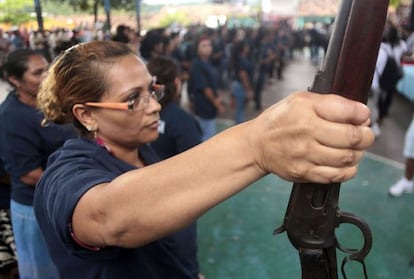Guerrero and Michoacán, two lawless states
Two western areas engulfed in a spiral of violence beyond the government’s control

The border state of Tamaulipas, in Mexico, was the recent setting for two major crackdowns against drug trafficking by the Enrique Peña Nieto administration. The arrest of Los Zetas’ leader a month ago, followed by the detention of the Gulf cartel chief last Saturday, both took place in this northern territory. Yet for several months now, national attention has been focusing on two other states which have become dangerous powder kegs.
Violence and lack of government control are the rule in Michoacán and Guerrero, in the west of the country. Both states are mired in a deep political crisis that makes them incapable of dealing with the bloody feuding between drug cartels in the region. Extending between both territories is Tierra Caliente, a fertile area devoted to poppy and marihuana crops; this was the original headquarters of the Cartel of the Knights Templar, now disputed by other criminal organizations. This last weekend alone, authorities found more than 20 dead bodies in Tierra Caliente, which literally means “hot land.”
Given the absence of a strong political power and the federal government’s inability to return peace to the area, many municipalities and indigenous communities in Guerrero and Michoacán have decided that enough is enough. Self-defense groups have multiplied in recent months; armed with high-caliber weapons, these vigilantes now watch over lawless towns where even the authorities have skulked away. In order to keep the criminal gangs at bay, these communities have become impenetrable fortresses that allow nobody in.
Massive exile
In late July, an attack in Michoacán during another particularly bloody weekend resulted in the death of Vice-Admiral Carlos Miguel Salazar, the highest-ranking navy officer so far to become the victim of organized crime.
In the face of all this, rural populations – which are hardest hit by the drug rings’ activities — have initiated a massive exodus; those who stay behind join the vigilante groups. Communities which have been paying extortion money to criminal gangs for years are furious over the lack of arrests.
An intervention by the army last week has raised the tension in the area yet further. For the first time, the military arrested 41 members of a self-defense patrol in Aquila (Michoacán), effectively dismembering the group. Other vigilante groups have announced road blocks and protest marches to demand that the federal government release these men. The fact is, as long as drug traffickers continue to thrive in Tierra Caliente, the armed fronts will do nothing but multiply.
Tu suscripción se está usando en otro dispositivo
¿Quieres añadir otro usuario a tu suscripción?
Si continúas leyendo en este dispositivo, no se podrá leer en el otro.
FlechaTu suscripción se está usando en otro dispositivo y solo puedes acceder a EL PAÍS desde un dispositivo a la vez.
Si quieres compartir tu cuenta, cambia tu suscripción a la modalidad Premium, así podrás añadir otro usuario. Cada uno accederá con su propia cuenta de email, lo que os permitirá personalizar vuestra experiencia en EL PAÍS.
En el caso de no saber quién está usando tu cuenta, te recomendamos cambiar tu contraseña aquí.
Si decides continuar compartiendo tu cuenta, este mensaje se mostrará en tu dispositivo y en el de la otra persona que está usando tu cuenta de forma indefinida, afectando a tu experiencia de lectura. Puedes consultar aquí los términos y condiciones de la suscripción digital.








































